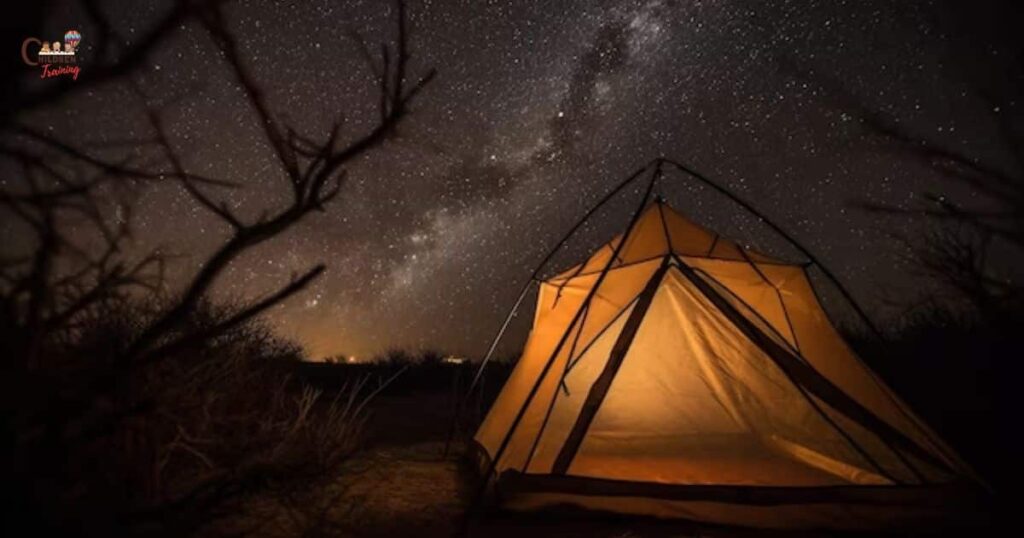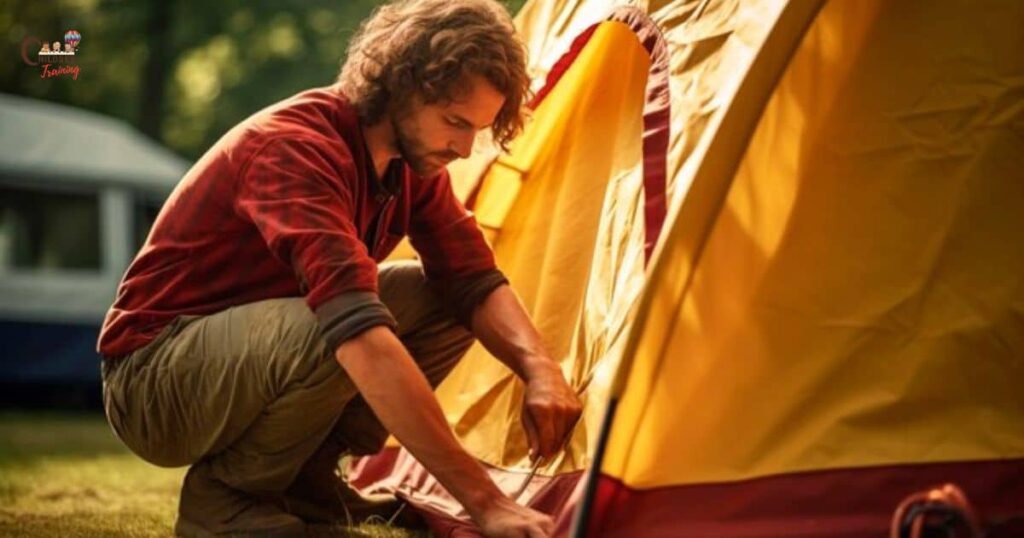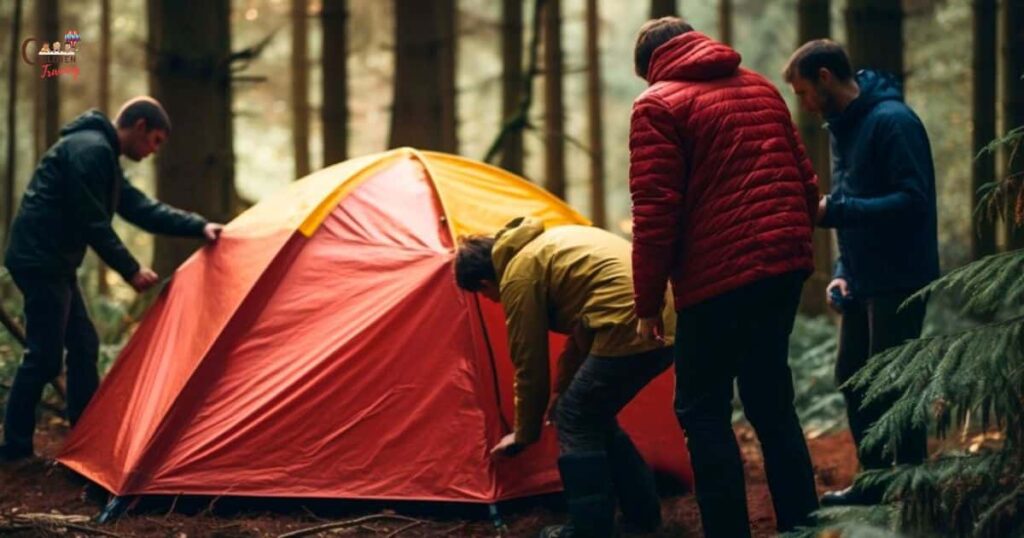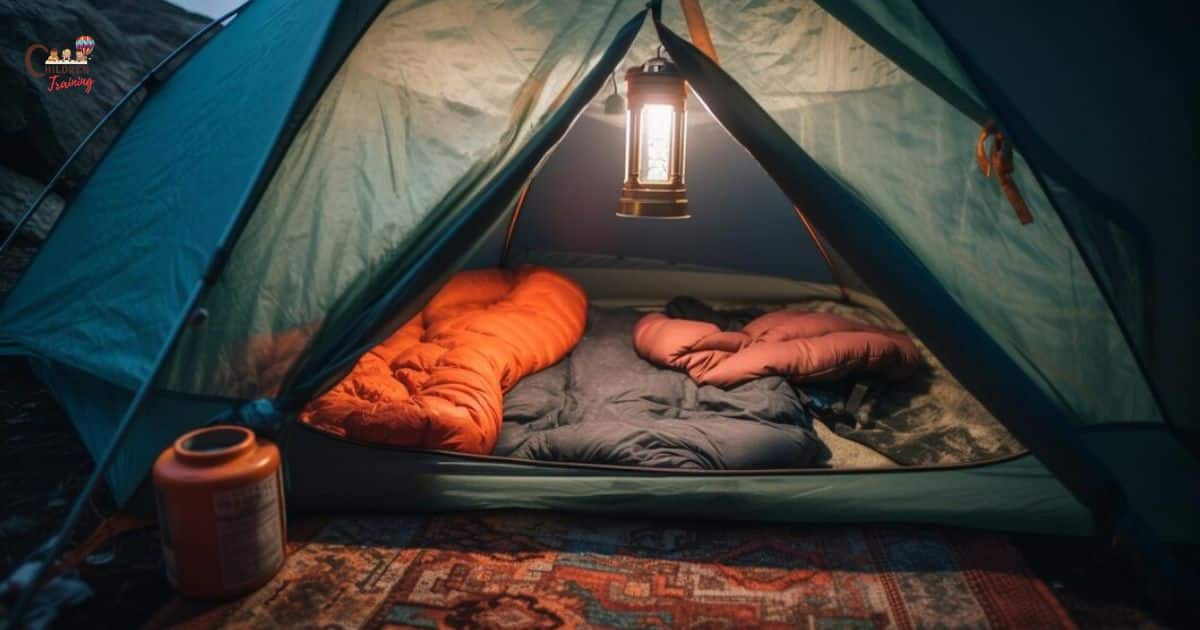Camping out sleep training involves parents letting their baby cry in their crib or bed for short periods before comforting them at night. It helps babies learn to fall asleep without help. Parents stay in the room but do not pick up or feed the baby unless they are truly distressed. The goal is for babies to self-soothe and learn to fall asleep independently.
Are sleepless nights keeping you and your baby awake? Discover how “camping out sleep training” can help foster independence. By sitting close yet refraining from immediate responses, this technique replicates the secure sleep environment babies naturally experienced earlier in their development. In a gentle manner, “camping out Montessori sleep training” teaches babies to self-soothe to sleep.
Rather than leaving babies to cry alone, “Camping Out Sleep Training” allows parents to comfort their child in a reassuring yet removed manner. Parents check every few minutes to ensure their baby’s well-being without rewarding crying with attention. In time babies understand the difference between nighttime and awake time, helping the whole family rest.
What is camping out

‘Camping out’ is a sleep training technique that can help babies learn to fall asleep on their own. It involves parents staying in the baby’s bedroom while they are falling asleep, without picking the baby up or feeding them. The parents are there to reassure the baby but not to respond immediately when they cry or fuss. By staying calmly in the room, parents show their baby they are nearby to keep them safe. This creates a similar atmosphere to when the baby first started sleeping, with parents close by.
The goal of ‘camping out’ is for babies to get used to falling asleep without help from their parents. Moms and dads watch and check on their baby from a chair or sofa in the room. They only pick the baby up and comfort them if they seem very upset. With time and consistency using this technique, babies understand parents will not come every time they cry at night. Soon they learn to fall asleep by themselves through self-soothing, which helps them rest well.
Who is camping out for
‘Camping out’ sleep training is appropriate for babies aged between 4 to 6 months. At this age babies are developmentally ready to learn how to fall asleep without feeds or rocking. They can understand that parents are nearby for comfort, without immediately coming when they cry. ‘Camping out’ works best for babies who are healthy and growing well. It may not be suitable for younger infants who still require night feeds. The technique also helps parents of older babies establish a calming bedtime routine and independent sleep habits.
‘Camping out’ can benefit families who are struggling with sleep problems. Many parents find their baby is waking frequently or will not settle alone at bedtime. This disrupts the whole household’s rest. The gentle ‘camping out’ approach teaches babies coping skills so all family members can sleep well. It allows parents to reassure their baby in the short term, while also encouraging independent sleep in the longer term. Consistency is key, but with time ‘camping out’ can result in better sleep for both babies and their caregivers.
Step-by-step guide to camping out

Camping out provides reassurance while encouraging self-soothing skills. Follow this step-by-step guide to establish a bedtime routine and help your baby learn to fall asleep alone.
- Establish a calming bedtime routine including bath, stories, quiet play before bed
- Put baby in crib awake while room is dark and comfortable
- Give baby a hug/kiss and say goodnight when putting them in crib
- Sit in chair near crib where baby can see you
- If they cry, wait a few minutes before soothing without picking up
- Can pat back or shush gently to soothe at first
- Slowly increase time before responding each night
- Over several nights, move chair farther from crib as baby settles
- Baby will learn you are nearby but won’t come immediately
- Once baby falls asleep independently for a full week, the skill is learned
- Then begin camping out for daytime naps too
- Be patient – consistency and time for baby to adjust are important
- Sticking to routine will result in better sleep for all
Tips for making camping out work

It is important to set your baby up for success when camping out sleep training. Make sure they are well-rested and fed before bedtime. Use a calming routine including a warm bath or massage. Play soothing music in the room to muffle sounds. Be patient and consistent – it may take several weeks until your baby is sleeping through the night. Do not give in to tears and maintain the interval between checks. Staying calm yourself will reassure your baby.
Other tips to encourage camping out are using white noise and keeping the environment dark, warm and comfortable. Place favorite toys and blankets in the crib for your baby’s comfort. During the day, resist naps outside of the crib to reinforce good habits. praise your baby happily when they settle alone, even if still crying a little. Soon they will understand that crying is not how they can get your attention at nighttime. Consistency in your approach will help your baby to sleep independently.
Will camping out work
Many parents wonder if camping out sleep training will be successful. If done correctly with consistency, camping out works for most babies. It may take time, but by around four to six months most babies are ready to learn to self-soothe to sleep. As long as baby is healthy and gaining weight well, staying close by in the room helps them feel safe as they learn. Be patient – it can take weeks to see results. Sticking to a routine and not giving in to cries is important.
Some signs camping out is working include the length of time between cries increasing each night and babies falling asleep faster. They may also ask to be rocked less during the day. Eventually the goal is falling asleep independently without support each night. If after two weeks there is no progress, it’s fine to take a break and try again later. But most find that with gentle persistence, camping out helps both baby and parents to sleep much better.
Crying and camping out: what to do

Some crying is normal when beginning to camping out train. Babies will cry to tell parents they want comfort at first. Do not rush in right away or pick up the crying baby. It is okay if they cry for 5-10 minutes when you start. Check on them by patting or shushing without picking up. Over time, slowly increase the minutes before responding as baby learns you will come when they are truly upset, but crying alone does not get them attention right away at night.
If a baby is hysterically crying for an extended time or appears to be in distress, it is fine to pick them up to comfort them. But do it calmly in a dim room without eye contact or conversation to avoid overstimulating. Once settled, place back in crib awake. Remember this is teaching a new skill and take breaks if exhausted. Contact your doctor if you are worried or baby seems unwell, loses appetite or gains less weight. With patience and consistency, camping out helps babies feel safe enough to sleep independently.
FAQ’s
How long does camping out method take?
The camping out method can take a few weeks to several months to work fully, depending on the individual baby. Consistency is key to seeing results over this time period.
What age is controlled crying OK?
Most experts recommend trying controlled crying sleep training no earlier than 4-6 months of age, as this is when many babies are developmentally ready to learn self-soothing skills.
Is controlled crying damaging?
While controlled crying can be stressful in the short term, research shows it is not emotionally or psychologically damaging when used appropriately for babes over 4 months.
What is the camp method for sleep training?
The camp method involves sitting in a chair near the crib and comforting baby by patting or shushing without picking them up as they learn to fall asleep independently.
How to do the camp out method?
The camp out method involves establishing a bedtime routine, then sitting near the crib to reassure baby without picking them up as they learn to self-soothe to sleep.
Conclusion
Camping out is a gentle sleep training technique that allows parents to be nearby for reassurance as babies learn the important skill of falling asleep independently. By following a step-by-step approach and providing a consistent bedtime routine and environment, parents can support their baby through the process. While it may take time, patience and sticking to intervals between checks, research shows this method is not psychologically harmful if carried out appropriately for babies aged four months and above.
Numerous families have found success with camping out, seeing steady improvement in their infant’s sleep patterns within a few weeks. Overall, using this guided approach can help both babies and parents achieve better quality rest, simply by encouraging self-soothing in a way that still offers comforting parental presence through the transition.










